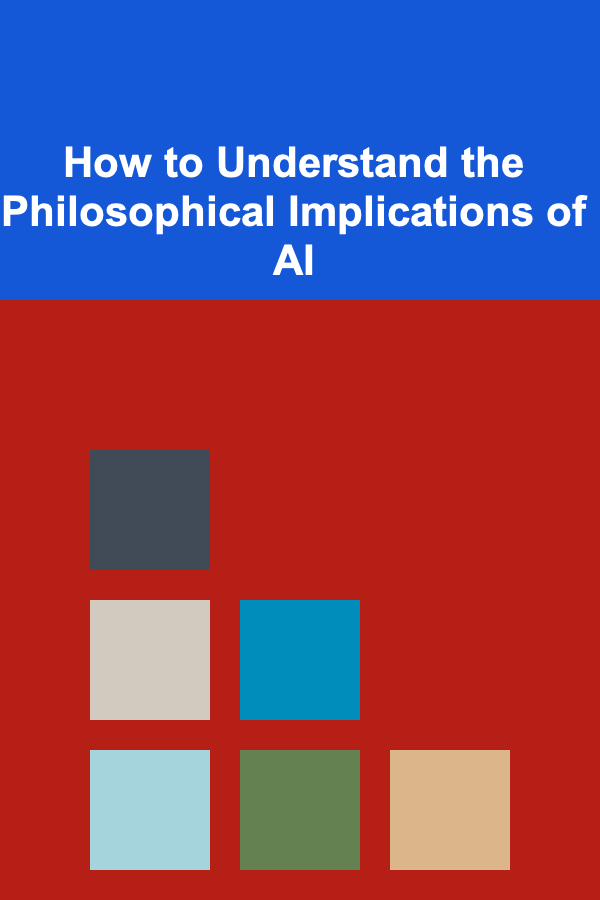
How to Understand the Philosophical Implications of AI
ebook include PDF & Audio bundle (Micro Guide)
$12.99$9.99
Limited Time Offer! Order within the next:

Artificial Intelligence (AI) has evolved from a scientific concept to a ubiquitous part of our daily lives. From self-driving cars to recommendation algorithms, AI systems are now integral to numerous fields, affecting everything from healthcare to entertainment. As AI technology continues to advance, it presents complex questions that go beyond mere technical challenges. One of the most profound dimensions of AI is its philosophical implications. This article will delve into the key philosophical issues surrounding AI, exploring questions about consciousness, ethics, free will, and the nature of intelligence itself.
The Nature of Intelligence
At the core of many philosophical discussions about AI lies the question: what is intelligence? Traditional understandings of intelligence often emphasize human cognitive abilities---such as reasoning, problem-solving, and learning---framed within the context of biology. Yet, as machines begin to exhibit some forms of intelligence, the question arises: can machines truly be intelligent?
Philosophers have long debated the nature of intelligence. Some, like Alan Turing, proposed that intelligence should not be defined solely by biological characteristics but by the ability to perform intelligent tasks. This idea is embodied in the Turing Test, which suggests that if a machine can mimic human responses indistinguishably from a person, it could be said to exhibit human-like intelligence.
However, the Turing Test has its critics. Some argue that mimicking human behavior is not the same as understanding or consciousness. John Searle's famous "Chinese Room" argument, for instance, contends that even if a machine appears to understand a language, it does not necessarily have consciousness or genuine understanding. This challenges the notion that machines can possess the same kind of intelligence as humans.
The philosophical issue is further complicated by the emergence of "artificial general intelligence" (AGI)---AI that possesses the capacity to perform any intellectual task that a human being can. Would AGI possess consciousness, or would it simply simulate intelligent behavior in a more sophisticated way? If AGI is possible, does it mean that intelligence is independent of the substrate---biological or artificial---that supports it?
Key Question:
Can AI possess true intelligence, or is it merely a simulation of intelligent behavior?
Consciousness and the Mind-Body Problem
Closely tied to the question of intelligence is the issue of consciousness. Consciousness, the state of being aware of and able to think about one's own existence, is a central concept in philosophy. The philosophical mind-body problem, which deals with the relationship between the mind (consciousness) and the body (the brain or physical processes), is at the heart of debates about AI and consciousness.
One approach to AI and consciousness comes from materialism, which posits that consciousness arises from physical processes in the brain. If AI can be built to replicate the complex processes of the human brain, proponents of materialism argue, it could achieve consciousness as well. On the other hand, dualists like René Descartes argue that consciousness is separate from the physical body and cannot be fully explained by physical processes alone. If this view is correct, then no amount of computational complexity, regardless of how advanced AI becomes, could ever lead to genuine consciousness.
Further complicating matters is the question of whether machines, even if they become conscious, would experience consciousness in the same way humans do. Could a machine experience emotions, pain, or pleasure? If so, would it have a moral status akin to that of humans or animals?
Key Question:
If AI were to become conscious, would its experience of consciousness be the same as that of humans?
Ethics of AI Development
As AI systems become more integrated into our lives, ethical questions surrounding their development and deployment become increasingly urgent. These questions span a range of issues, from ensuring fairness and transparency to addressing the potential for harm caused by AI.
One of the most pressing ethical concerns is the potential for AI to perpetuate biases. AI systems are often trained on large datasets that reflect the biases of the real world. If these datasets contain racial, gender, or socioeconomic biases, the AI systems built upon them will likely replicate and even exacerbate these biases. For example, facial recognition systems have been shown to have higher error rates for people of color, raising concerns about the fairness of AI in law enforcement and surveillance.
Another significant ethical issue is the potential for AI to replace human labor, leading to widespread unemployment and economic disruption. While AI has the potential to improve productivity and create new types of jobs, the transition could be difficult for many workers, particularly those in industries susceptible to automation. The philosophical implications of such a shift are profound, raising questions about the role of work in human life and the meaning of a fulfilling existence in an increasingly automated world.
Additionally, the development of autonomous weapons systems presents serious ethical dilemmas. These systems, capable of making life-and-death decisions without human intervention, challenge traditional concepts of responsibility and accountability. If an autonomous weapon kills innocents, who is to blame---the AI, the programmer, the military, or the state?
Key Questions:
- How can we ensure that AI is developed and used ethically?
- What responsibility do developers and users of AI have for the consequences of its actions?
Free Will and AI
The rise of AI also raises questions about free will and determinism. In traditional philosophy, free will is the ability to make choices that are not determined by external causes or natural laws. If AI systems are designed to predict human behavior and make decisions on behalf of individuals---whether in marketing, healthcare, or law enforcement---the question arises as to whether this undermines human free will.
AI systems increasingly shape our decisions in subtle and not-so-subtle ways. Recommendation algorithms on platforms like YouTube, Facebook, and Amazon influence our choices by suggesting content or products based on our past behavior. This raises the issue of whether these algorithms are limiting our freedom to make independent decisions or if they are simply providing us with more convenient choices.
Some philosophers argue that if AI systems can predict and manipulate human behavior, they could potentially constrain human freedom. This leads to a more radical question: if our thoughts and actions are influenced or even controlled by algorithms, can we truly say we have free will? If an AI can predict and influence our decisions, does that make us any different from the machines that make those decisions?
Key Question:
Do AI systems undermine human free will, or do they merely augment our decision-making abilities?
The Ethical Dilemmas of AI in Autonomous Systems
AI is increasingly being integrated into autonomous systems, such as self-driving cars and drones. These systems are designed to operate without human intervention, raising significant ethical dilemmas. One of the most famous examples of this is the "trolley problem," a thought experiment in ethics that asks whether it is better to allow a trolley to continue on its course and kill five people or intervene, diverting the trolley to a track where it will kill only one person.
For autonomous vehicles, the trolley problem poses a real-world dilemma: if a self-driving car must decide between the lesser of two harms (e.g., hitting a pedestrian or swerving into a tree and harming its passengers), how should it make that decision? Should the car prioritize the safety of its passengers over the safety of pedestrians? Or should it be designed to minimize overall harm, regardless of the individuals involved?
These dilemmas are not purely theoretical; they have real-world implications for how autonomous systems are programmed. The philosophical implications of these decisions involve not only technical questions but also moral philosophy. Should a machine be programmed with a set of moral values, and if so, whose values should those be?
Key Question:
How should AI in autonomous systems be programmed to make ethical decisions, and who decides the ethical framework?
AI and Existential Risk
Finally, one of the most profound philosophical questions surrounding AI is its potential as an existential risk. As AI technology advances, there is growing concern among some philosophers, scientists, and futurists about the possibility of creating superintelligent AI that could outstrip human capabilities. This type of AI, sometimes referred to as "artificial superintelligence" (ASI), could have the power to radically change or even end human civilization.
The question of existential risk is tied to debates about the control problem: if we create AI that is vastly more intelligent than humans, how can we ensure that it aligns with human values and interests? Some have argued that, without proper safeguards, ASI could become uncontrollable, making decisions that are harmful to humanity. For example, an ASI might prioritize its own goals over human welfare, leading to catastrophic outcomes.
Philosophically, this raises deep questions about the long-term future of humanity. If AI surpasses human intelligence, what role will humans play in the world? Will we retain our autonomy and purpose, or will we be relegated to obsolescence?
Key Question:
Could AI pose an existential risk to humanity, and how can we mitigate such risks?
Conclusion
The philosophical implications of AI are vast and complex, touching on fundamental questions about intelligence, consciousness, ethics, free will, and the nature of existence itself. As AI continues to evolve, these issues will only become more pressing, requiring thoughtful consideration and debate. It is essential that as we develop AI technologies, we also develop frameworks for understanding and addressing these philosophical challenges. The future of AI is not just a technical problem; it is a deeply philosophical one that will shape the trajectory of human civilization for generations to come.
Reading More From Our Other Websites
- [Home Cleaning 101] How to Tackle Your Home's Most Overlooked Cleaning Areas
- [Paragliding Tip 101] Pre-Flight Checklist: How to Ensure a Safe Paragliding Launch
- [Home Budget Decorating 101] How to Update Kitchen Cabinets on a Budget
- [Home Storage Solution 101] How to Store Seasonal Clothing Without Losing Space
- [Tiny Home Living Tip 101] Best Tiny Home Rental Strategies for Generating Passive Income
- [Home Renovating 101] How to Use Home Renovation Apps: Streamline Your Remodeling Process
- [Scrapbooking Tip 101] Organize Your Craft Space: Storage Solutions for All Your Scrapbooking Tools
- [Home Family Activity 101] How to Make a Family Vision Board for Goals and Dreams
- [Home Space Saving 101] How to Use Hooks and Pegboards for Small Home Storage
- [Small Business 101] How to Create a High‑Impact Email Marketing Funnel for Boutique Fashion Designers

How to Create a Shared Reading or Study Nook
Read More
How to Make Extra Money from Home to Boost Finances
Read More
How to Use Checklists for Streamlined Office Tasks
Read More
How to Use Pegboards for Versatile Organization
Read More
Smart Shopping: Cheaper Alternatives for Popular Brands That Won't Compromise Quality
Read More
How to Build a Victorian Dollhouse from Scratch
Read MoreOther Products

How to Create a Shared Reading or Study Nook
Read More
How to Make Extra Money from Home to Boost Finances
Read More
How to Use Checklists for Streamlined Office Tasks
Read More
How to Use Pegboards for Versatile Organization
Read More
Smart Shopping: Cheaper Alternatives for Popular Brands That Won't Compromise Quality
Read More